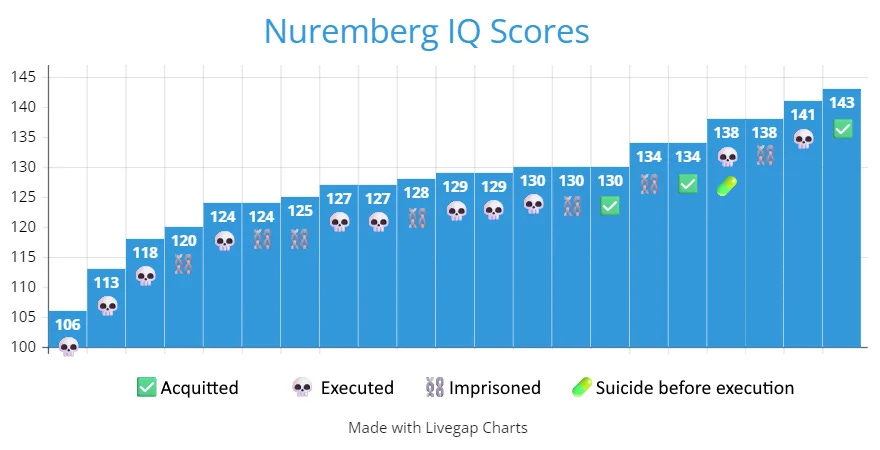Did high IQs protect top Nazis at Nuremberg?
Maybe
The Nazis famously carried out a number of atrocities involving the populations under their dominion. Most famously, this involved the mass murders of Jews in Europe, but quite a number of fellow European civilians were killed too, and various executions of elites (especially Polish). After the war, the victors sought to find those responsible for various war crimes. In these Nuremberg trials, there were 24 defendants, and they were given intelligence tests (data here). Reddit poster MeIerEcckmanLawIer made this suggestive plot:
I am not sure why their intelligence was measured, but it was carried out by a Jewish American with German roots called Gustave Gilbert. He spent a lot of time in talks with the various Nazis and as part of this, gave them various psychology tests, even the Rorschach inkblot test. Göring was particularly forthcoming about the nature of political regimes and war:
Göring: Why, of course, the people don't want war. Why would some poor slob on a farm want to risk his life in a war when the best that he can get out of it is to come back to his farm in one piece? Naturally, the common people don't want war; neither in Russia, nor in England, nor in America, nor for that matter in Germany. That is understood. But, after all, it is the leaders of the country who determine the policy and it is always a simple matter to drag the people along, whether it is a democracy, or a fascist dictatorship, or a parliament, or a communist dictatorship.
Gilbert: There is one difference. In a democracy the people have some say in the matter through their elected representatives, and in the United States only Congress can declare wars.
Göring: Oh, that is all well and good, but, voice or no voice, the people can always be brought to the bidding of the leaders. That is easy. All you have to do is tell them they are being attacked, and denounce the pacifists for lack of patriotism and exposing the country to danger. It works the same way in any country.
If one looks at the plot above, there seems to be a tendency for the higher IQ Nazis to get better verdicts. I loaded the data into R, and we get this plot:
Mind you, of course, there are only 21 datapoints here, 3 acquittals, 7 prison sentences, and 11 death sentences.
Statistically speaking, is this enough? Well probably not, but we can try nonetheless. The prison sentences had varying lengths, which is hard to model here, but we can model the data either as binary outcomes for the most or least severe punishments (death vs. not-death, or acquitted vs. not-acquitted). Doing so we obtain the following model results:
Logistic Regression Model
lrm(formula = verdict_death ~ IQ, data = d)
Model Likelihood Discrimination Rank Discrim.
Ratio Test Indexes Indexes
Obs 21 LR chi2 1.79 R2 0.109 C 0.655
FALSE 10 d.f. 1 R2(1,21) 0.037 Dxy 0.309
TRUE 11 Pr(> chi2) 0.1809 R2(1,15.7)0.049 gamma 0.321
max |deriv| 0.0002 Brier 0.231 tau-a 0.162
Coef S.E. Wald Z Pr(>|Z|)
Intercept 9.3954 7.5090 1.25 0.2109
IQ -0.0725 0.0583 -1.24 0.2136
Logistic Regression Model
lrm(formula = verdict_acquitted ~ IQ, data = d)
Model Likelihood Discrimination Rank Discrim.
Ratio Test Indexes Indexes
Obs 21 LR chi2 3.41 R2 0.268 C 0.843
FALSE 18 d.f. 1 R2(1,21) 0.108 Dxy 0.685
TRUE 3 Pr(> chi2) 0.0649 R2(1,7.7)0.268 gamma 0.725
max |deriv| 5e-07 Brier 0.104 tau-a 0.176
Coef S.E. Wald Z Pr(>|Z|)
Intercept -24.6375 14.8535 -1.66 0.0972
IQ 0.1736 0.1106 1.57 0.1165
Logistic Regression Model
lrm(formula = verdict_ordinal ~ IQ, data = d)
Model Likelihood Discrimination Rank Discrim.
Ratio Test Indexes Indexes
Obs 21 LR chi2 3.01 R2 0.155 C 0.679
Death 11 d.f. 1 R2(1,21) 0.091 Dxy 0.359
Prison 7 Pr(> chi2) 0.0828 R2(1,17.1)0.111 gamma 0.376
Acquitted 3 Brier 0.233 tau-a 0.224
max |deriv| 8e-09
Coef S.E. Wald Z Pr(>|Z|)
y>=Prison -12.3687 7.7419 -1.60 0.1101
y>=Acquitted -14.2359 7.8862 -1.81 0.0710
IQ 0.0960 0.0602 1.60 0.1105 The R2 values are 11%, 27%, and 16%, however, the p values are .18, .06, .08. So they are certainly suggestive, and would be p < .05 if we stipulated the direction of association ('one-sided test'). As far as I can see here, there's nothing more we can do about the data from a statistical perspective, there's a signal but we can't be sure.
To note, of the 24 defendants, there were IQ data for 21. Why is it missing for the last 3? Martin Bormann was tried in absentia as his whereabouts were unknown, was given a death sentence, but it turned out he was already dead anyway. Gustav Krupp von Bohlen und Halbach was tried in error, as they actually should have tried his son who was running things (which they later did). Robert Ley killed himself before the trial could begin.




Goering got someone to smuggle him a cyanide capsule so he must be the 138 score. He was a WWI ace (22 kills) and not any kind of intellectual. Makes me wonder if (good) fighter pilots perhaps tend to have high IQs. They certainly have to be high in visuospatial processing.
Very interesting analysis. I have kind of heard this before, at least as related to Speer and his obviously high IQ and ability to defend himself. Some of the top leaders clearly had high IQs, without seeing the names mapped onto your IQ chart I'd say top IQs would have been Goering and Speer. No doubt Himmler and Goebbels were also high IQ, you cant manage what they did and not be intelligent. Of course morality and intelligent are not correlated, as we even see today with the Treason of The Intellectuals.